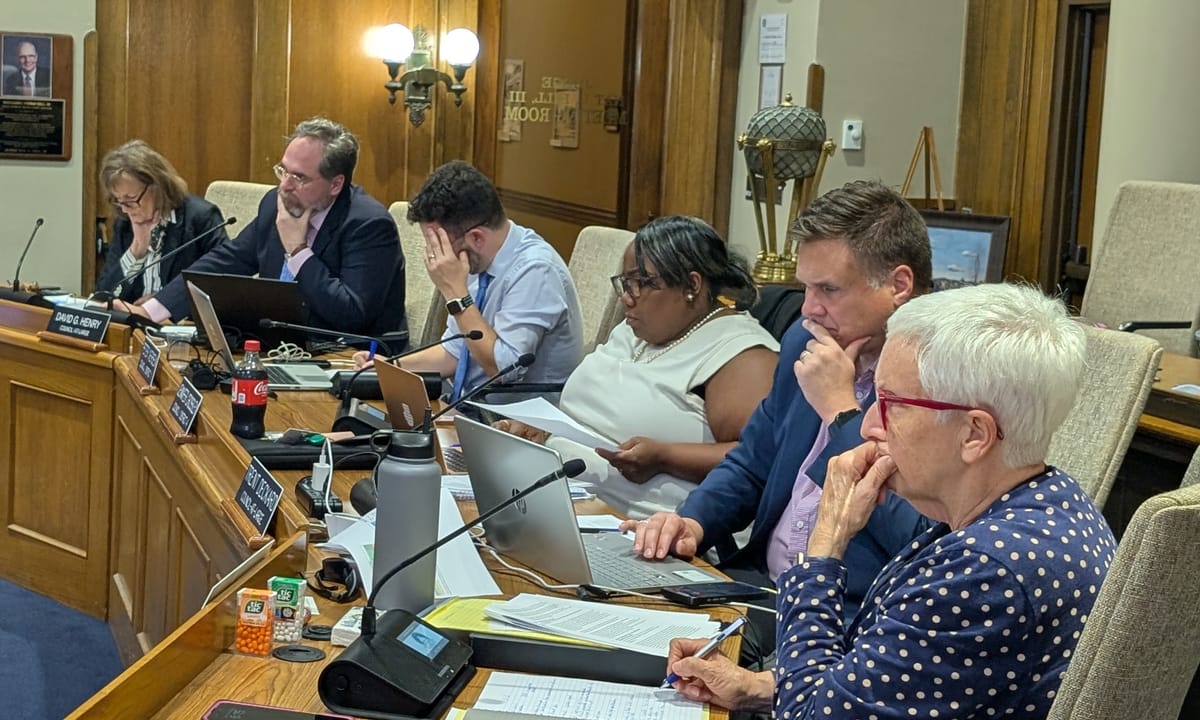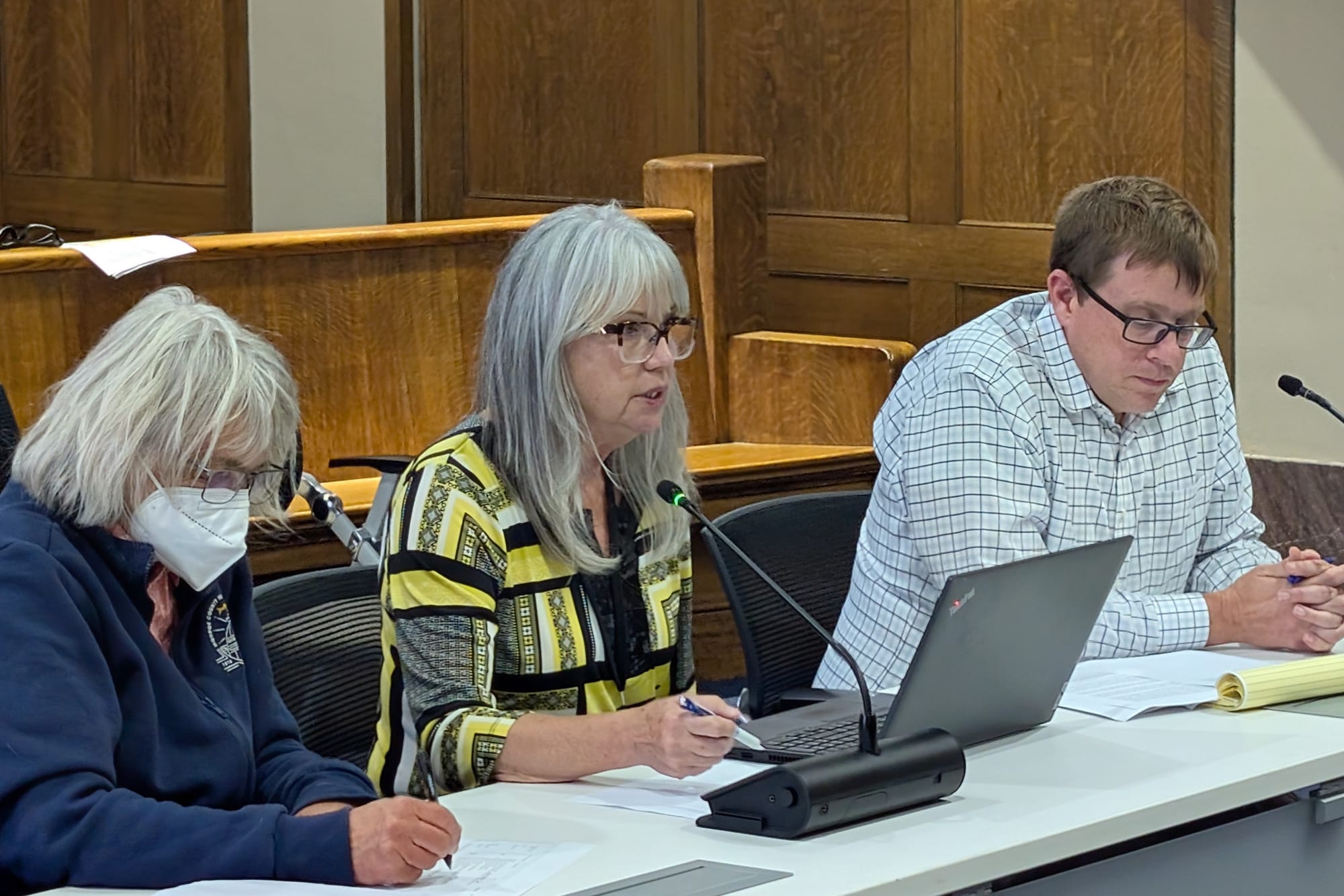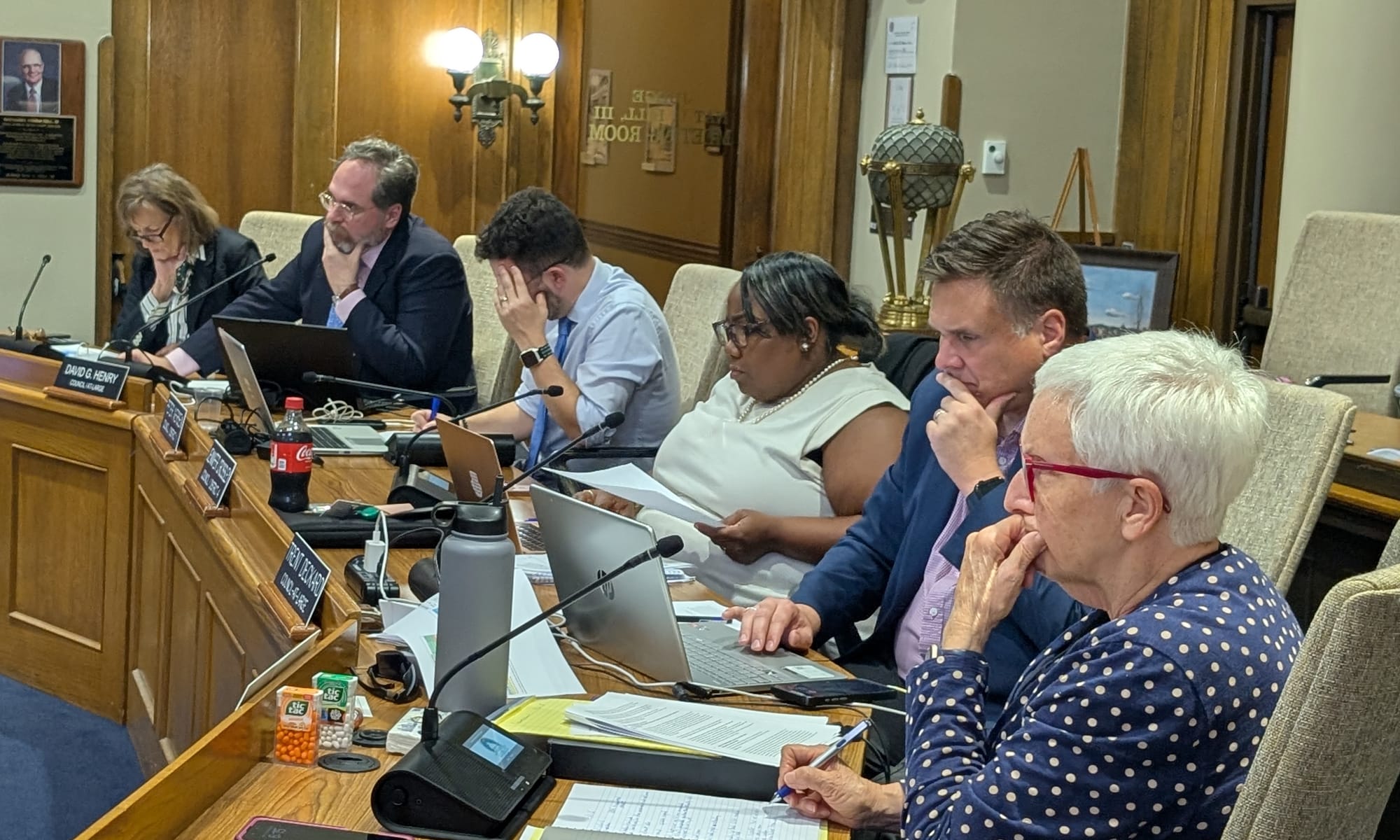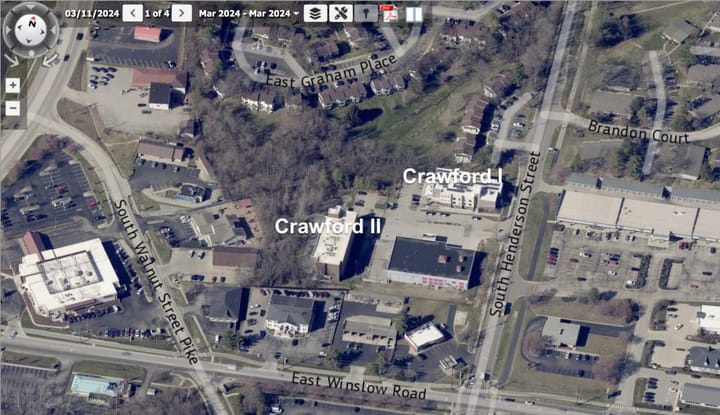Monroe County grapples with 2026 budget: Bonds, mold, overtime, hiring, and minimum cash balances
The Monroe County council continued its 2026 budget deliberations Tuesday night, mostly after the regular meeting agenda was dispatched. Councilors talked about resolutions on overtime use, and a hiring freeze, as well as a resolution about minimum cash balances.



Left: County commissioner Julie Thomas, administrator for the commissioners Anglie Purdie, and county attorney Jeff Cockerill. Right: County councilors from left: Marty Hawk, David Henry, Peter Iversen, Jennifer Crossley, Trent Deckard, and Liz Feitl. (Dave Askins, Sept. 23, 2025)
The Monroe County council continued its 2026 budget deliberations Tuesday night, mostly after the regular meeting agenda was dispatched.
The agenda was made a little lighter when an item about adding health department jobs was put off until Oct. 14. The added positions are being considered to make up for a public health services gap that will be left when IU Health ends its long-time contract at the end of the year.
The working figure for the 2026 draft budget deficit has crept back up to around $5 million, from about $3.8 million, after staff identified an internal miscommunication during an on-the-fly calculation at the council’s most recent meeting.
There were no truly final decisions made on Tuesday, in part because of the budget adoption schedule, which calls for a public hearing on Sept. 30, and a vote to adopt the 2026 budget on Oct. 14.
Among the big budget-related items getting discussion on Tuesday was the issuance of $6 million in general obligation (GO) bonds with a six-year term. Commissioner Julie Thomas was there for the county board of commissioners, along with administrator Anglie Purdie. Councilors pushed for an explanation of why the proposed project list for the GO bonds didn’t include expenditure to address persistent concerns about mold in the justice building.
The council adopted a resolution regulating overtime, effective Oct. 5, but left a resolution on a hiring freeze without a vote, until more feedback with department heads can be collected.
Added to the agenda was a discussion about adjusting the council’s adopted minimum fund balances downward, but that will be informed by a meeting between county officials and Financial Solutions Group (FSG), the county government’s financial advisor, on Wednesday. FSG has already weighed in with a letter just a week ago that says it recommends sticking with the adopted minimum fund balances.
GO bonds and mold at the justice building
Monroe County government is planning to issue $6 million in GO bonds, using a six-year term, which sidesteps a new one-year “cooling off period” that applies to GO bonds with terms of five years or less.
The council’s discussion of GO bonds on Tuesday included ongoing concerns about mold and air quality in the county’s justice building. Council president Jennifer Crossley and other members talked about the technical and financial aspects of mold remediation, with particular attention to the building’s HVAC system.
The projects that are included in the GO bond issuance are: design work for improvements at the Monroe County Airport, renovations to the Showers Building for voter and election services, vehicles, Youth Services Bureau improvements, nature preserve upkeep, courthouse and courthouse grounds, body cameras and non-lethal equipment for the sheriff, airport furniture and tools, and emergency management equipment and sirens.
Crossley asked if the idea is to use remaining funds from the cumulative capital development fund to address justice building HVAC improvements, given that they are not included in the project list in the upcoming GO bond issue.
The conversation was prompted by questions about whether the HVAC system had been adequately tested and whether ductwork needed to be cleaned or replaced. Crossley attended a meeting a month ago between VET Environmental Engineering staff and justice building employees about the mold situation in the building. Crossley said about her impression of that meeting: “And I walked away from that conversation at least thinking that [the HVAC system] was something that was going to be looked at.”
Administrator for the commissioners Angie Purdie responded to the idea of cleaning the ductwork by saying: “Why would we invest funds to clean out the ductwork, if the air that you’re breathing has acceptable levels? That’s my question. Why would we do that, if we’re at acceptable levels?”
Councilor David Henry questioned the idea of issuing new bonds to cover some of the capital expenses, when those expenses could be covered with remaining funds from previous GO bonds over the last 11 years. Purdie responded to Henry by saying it is her routine practice that whenever a request for a capital expenditure comes from a department that she checks the funds from previous bonds to see if there is money available to pay for it
The GO bonds will appear on the agenda for the Oct. 14 county council meeting.
Overtime resolution: Passed effective Oct. 5
At Tuesday’s meeting, the council also took up a resolution to restrict overtime spending across most county departments, with exceptions for 24-hour operations such as the sheriff’s office, jail, and highway department. The resolution requires departments seeking additional overtime appropriations to come before the council with detailed reports.
After a long deliberation about the timing and fiscal impact of the resolution, the council voted to adopt it, with an effective date of Oct. 5, 2025, to align with the start of a new payroll period. The resolution passed by a 4-2 vote, with Peter Iversen and Trent Deckard dissenting, based on the idea that the council should wait to vote until the fiscal impact of such a resolution is better understood.
Councilor Marty Hawk emphasized the urgency: “Whatever we can do to make sure that we’re reducing our expenditures is important to do, and the sooner we do it, the better. And so I would like to see a vote on this tonight, and then we can make an amendment to it, the next meeting.”
Hiring freeze resolution: Still in draft form
The council’s proposed resolution to temporarily freeze the hiring of full- and part-time staff remains under discussion. The draft resolution, modeled after a similar measure adopted during the COVID-19 pandemic, would require departments to seek council approval before filling most vacancies, with exceptions for public safety and other essential positions.
Councilors deliberated on how to handle positions funded by grants, those already in the hiring pipeline, and the definition of “public safety.” Councilor Peter Iversen said, “We need to think pretty broadly about this. … When someone goes for a hearing—we’ve got our public defender in the back of the room here—is that an issue of public safety that people have representation in the courts?”
Councilor Deckard suggested a “ramping-up” period, allowing departments to submit lists of positions already in the hiring process before the freeze takes effect.
The council agreed to get feedback from department heads, with a deadline of noon Thursday for input, and to revisit the resolution at next week’s meeting on Sept. 30.
Minimum fund balance resolution: Philosophical divide
A place where at least two councilors—David Henry and Trent Deckard—are sharply divided in their philosophical perspectives is the county government’s minimum fund balance policy. The current resolution, adopted in June on the advice of the county’s financial advisor FSG, sets the general fund minimum balance at $15 million—up from $10 million last year.
Councilor Trent Deckard floated the idea that the higher minimum was putting undue pressure on the budget this year. “I am concerned that that additional $5 million is starting to creep into the pressure that we’re feeling.” Deckard said he wanted to hear FSG’s response to the idea of a $12-million minimum cash balance for the general fund.
Deckard recalled a quote from former state representative Jeff Espich: “Government is not a bank.” About that quote, Deckard said, “Now I don’t believe that that statement is 110% of the time, but we have to be very careful that in our effort to hit these high standards of money we want to kind of have on hand, that we’re not forcing ourselves to cut services or cut things without being smart about it.”
Henry defended the higher minimum as a prudent safeguard: “I think it’s probably best to think of the minimum fund balance as a shield or our insurance policy against those shocks.” Henry drew an analogy: “I don’t think the answer to a leaky budget is to lower the basement floor. I think it’s to go find the holes in our budget and go make the cuts where they need to be.”
Henry continued, saying he wants to maintain the cushion that’s been recommended by FSG, for two reasons, “First is, it’s good accounting practice when we get audited under generally accepted accounting principles.” Henry added “We also know that the commissioners would like to bond somewhere between $10 and $17 million every year for the next 20 years to build a criminal justice facility. That’s a lot more bonding, which means you have to show the market that you’re good for money with the double A bond rating that we have in the county.”
The council agreed to seek further guidance from FSG, with a meeting scheduled between county attorney Molly Turner-King set for the following day, and to revisit the issue at the next council meeting.
But FSG has weighed in as recently as last week on the question of lowering the cash balance policy, advising the county to stick with the policy adopted in June.
Henry asked a key question about the cash balance policy: “When we lower the minimum fund balance, what does that do to the deficit?” The answer from the auditor’s office: “Nothing.”
The council’s next meeting, set for Sept. 30, will include the public hearing on the 2026 budget.




Comments ()